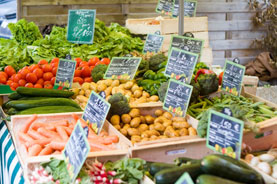The food we eat is a major factor in the promotion and maintenance of health. Much of the American diet is unhealthy with too much fat, meat, grease, dairy products and bread.
Studies show that many foods contain protective substances that help guard against cancer. Most research indicates the following cancer diet guidelines are helpful for those wanting to prevent or help treat the disease.
What to increase in your diet:
- Vegetables, especially leafy greens and other colorful veggie treats, and salads
- Fruits, especially those rich in A polyphenol is a chemical compound belonging to a group of chemical substances found in plants. Polyphenols act as antioxidants or substances that may protect cells against damage through interacting with and stabilizing free radicals. According to the National Cancer Institute, free radical damage may lead to cancer. Polyphenol content (apples, blackberries, blueberries, cherries, grapes, pears, plums and raspberries). Polyphenols are also found in legumes, broccoli, cabbage, celery, onions, red wine, chocolate, green tea olive oil and honey. Note: Some experts recommend against fruits for cancer patients due to natural sugar content and sugar's impact on disease co-factors (talk to your doctor about this)
- Fiber, including whole grains, beans, and nuts
- Fish without high levels of heavy metals such as mercury
- Eggs
- Healthy oils, especially olive oil (avoid trans-fat)
- Garlic, onions, herbs, and spices such as turmeric
What to decrease in your diet:
- Animal meat, especially red meat
- Dairy products (except skim milk and 1% milk), especially those that contain growth factors and anti-biotics
- Sugars
- Salt and salt-preserved foods
- Unrefined grains made with white flour (cookies, cakes, bread)
- Unhealthy fats (saturated)
Studies recommend avoiding frying, smoking, barbequing, and microwaving due to increased cancer risk from those types of food preparation.








